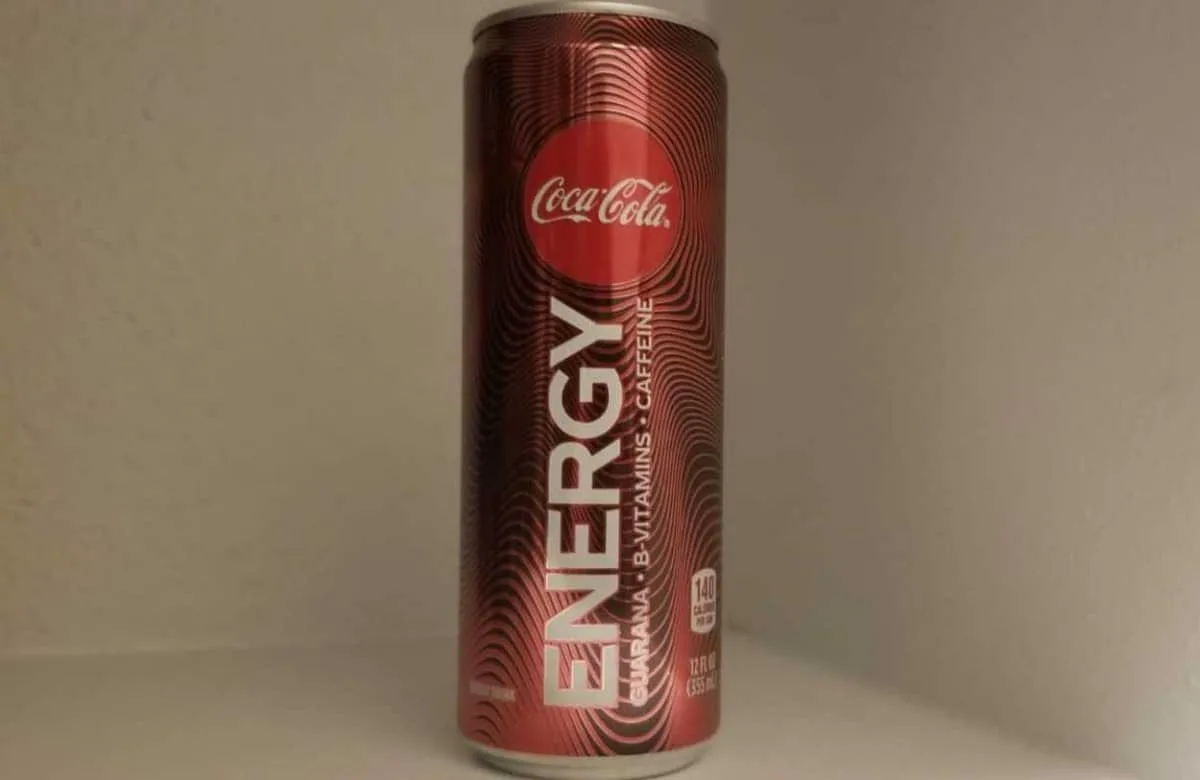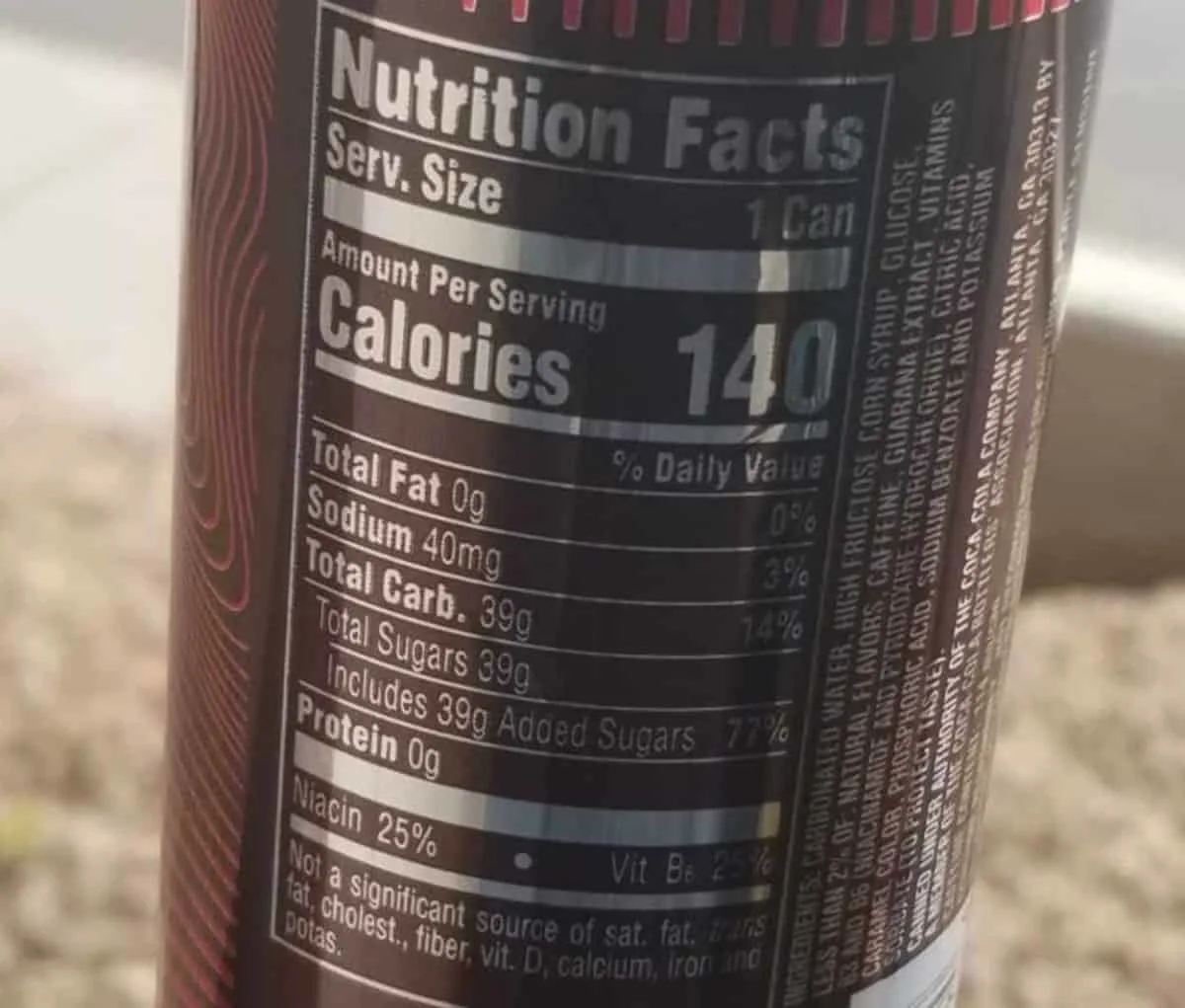Each 12 fl.oz can of Coca-Cola Energy has 114mg of caffeine and 140 calories, which are moderate amounts for an energy drink its size. But it also contains 39g of sugar.
So, does this make Coca-Cola Energy bad for you?
In brief, yes. Although its caffeine and calorie content is considerable, the 39g of sugar in Coca-Cola Energy far exceeds the daily recommended sugar limit set by the AHA. Thus, having this energy drink can affect your long-term health.
But of course, there’s more to consider to fully determine whether this energy drink is bad for you or not, so dive into the article below!

Contents
Coca-Cola Energy Nutrition Facts
Firstly, let’s look at the nutritional values you’ll get from a 12 fl.oz can of Coca-Cola Energy:
| Typical Value (Standard Serving) | Coca-Cola Energy (12 fl.oz) |
| Energy | 140 calories |
| Protein | 0g |
| Fat (Of which Saturated) | 0g (0g) |
| Carbohydrates (Of which Sugars) | 39g (39g) |
| Caffeine | 114mg |

How Many Calories Does Coca-Cola Energy Have?
Each 12 fl.oz can of Coca-Cola Energy Drink contains around 140 calories. I think that’s a pretty average amount of calories to have for an energy drink its size.
For reference, experts recommend a daily calorie intake of around 2,000 – 2,500 calories for healthy adults, so a can of Coca-Cola Energy won’t make a big dent in your diet.
If you’re someone who regularly works out, I think it’ll work best for a pre-workout drink as it’ll supply you with extra calories to burn off.
It’s a given that consuming the right calories daily and burning them through exercise will help you achieve your desired waistline in no time!
However, you may want to opt for other energy drinks with lower calorie content if you’re on a strict diet, as it’ll be just as easy to pile up on calories, especially if you’re not careful.
While controlling your overall calorie intake is crucial to maintain a healthy figure and avoid health problems in the long run, it’s also best to eat a properly balanced meal.
Remember, energy drinks don’t contain all the nutrients your body needs to keep going, so avoid using them as a meal replacement.
Coca-Cola Energy Ingredients
A 12 fl.oz can of Coca-Cola Energy drink contains the following ingredients:
- Carbonated water
- High Fructose Corn Syrup
- Glucose
- Caffeine
- Guarana Extract
- Citric Acid
- Caramel color
- Sodium Bicarbonate
- Phosphoric Acid
- Vitamins B3 (Niacinamide)
- Vitamins B6 (Pyridoxine Hydrochloride)
- Sodium Benzoate
- Potassium Sorbate
How Much Caffeine Is There In A Coca-Cola Energy?
Coca-Cola Energy Drink contains a modest amount of 114mg of caffeine per 12 fl.oz serving.
Considering that energy drinks can contain as little as 50mg to a whopping amount of 300mg of caffeine in a can, the 114mg caffeine in Coca-Cola Energy seems average.
Furthermore, it’s way below the recommended limit for healthy adults, a maximum of 400mg caffeine a day, set by the FDA.
If taken in moderation, caffeine is a stimulant that helps us stay alert and keeps us energized. It’s no wonder why millions of people take it first thing after waking up or in the middle of a lazy day.
But keep in mind that too much of a good thing can eventually be bad. That’s why over-consuming caffeine will lead to health problems such as:
- Restlessness
- Jittery feeling
- Insomnia
- Headaches
- Dizziness
- Rapid
- Palpitations
- Dehydration
- Anxiety
- Dependency
While everyone has a different caffeine metabolism and Coca-Cola Energy’s caffeine content may be tolerable for you, it’s still best to control your intake to avoid serious health issues.
How Much Sugar Is There In Coca-Cola Energy?
There’s 39g of sugar in a 12 fl.oz can of Coca-Cola Energy drink, which is way too much sugar to have regularly.
I’m not against indulging in some sweet cravings once in a while as it’s completely normal, but the 39g of sugar in a single can of Coca-Cola Energy is alarming.
According to the AHA, women should have not more than 26g of sugar while men have a limit of 36g of sugar in a day. As you can see, having just one can of this drink will definitely wipe out your entire sugar limit for the day.
That said, including Coca-Cola Energy in your regular diet may lead to some health issues such as:
- Acne
- Weight gain
- Heart disease
- Diabetes
- Cancer
- Depression
Clearly, Coca-Cola Energy isn’t the healthiest energy drink out there due to its high sugar content. That’s why I don’t recommend this drink at all if you’re someone with a pre-existing medical condition like obesity or diabetes.
Even if you’re relatively healthy, it’s still not a safe energy drink to have every day as it can be detrimental to your health in the long run. That said, having Coca-Cola Energy once in a while is okay though it’s best to keep your intake to only one can.
Is The High Fructose Corn Syrup In Coca-Cola Energy Bad?
The High Fructose Corn Syrup (HFCS) in Coca-Cola Energy drink isn’t bad for you, as long as you keep your consumption to a minimum and keep your health in check.
HFCS is an artificial sugar derived from corn syrup. It’s also FDA approved, which explains why you can find it in most processed food and drinks.
However, high levels of HFCS is associated with various health risks such as obesity and diabetes. It’s also said that overconsuming can affect your metabolism.
But if you’re drinking Coca-Cola Energy moderately, I don’t think you should worry much about its HFCS content. It’s also a good idea to consult your doctor before including this drink in your diet to see how it fits in your diet.
If you’re interested to learn more about HFCS, check out the video below:
Is The Guarana Extract In Coca-Cola Energy Bad For You?
Coca-Cola Energy also includes Guarana extracts, which contain over 400 times more caffeine than regular coffee beans due to its stimulants such as caffeine and antioxidants. It may bring about side effects for you if you’re sensitive to caffeine.
Guarana extract comes from the Guarana plant, derived by the Guarani tribe located in the Amazon. Many use it for its benefits that include reducing weight and fatigue.
Plus, this ingredient can also enhance your mental performance, making it easier for you to memorize your lecture notes.
Although you may want to opt for energy drinks that contain lesser caffeine if you have a low tolerance for caffeine as going over your limit may do you more harm than good.
The reason is that caffeine’s a stimulant, and consuming too much of it could speed up your nervous system. Thus, overconsumption of guarana can increase your heart rate and cause heart problems and high blood pressure.
Is Coca-Cola Energy Bad For You?
Coca-Cola Energy has a moderate amount of caffeine and calorie content, while its high sugar content can pose health risks if you excessively consume it.
Let’s compare the content of Coca-Cola Energy and the limits set by experts, shall we?
| Coca-Cola Energy (12 fl.oz) | Recommended Daily Limit | |
| Calories | 140 calories | 2,000 – 2,500 calories |
| Caffeine | 114mg | 400mg |
| Sugar | 39g | 25g (women) and 36g (men) |
As seen in the chart, Coca-Cola Energy Drink’s calories and caffeine are below the daily limit. Although, 114mg of caffeine can be too much for you if you have a low caffeine metabolism.
Even if that’s a typical amount of caffeine for you, you still need to be cautious of caffeine dependence. You know you’re caffeine-dependent when you have a hard time cutting back or when you can no longer function without it.
Once you need to stop, you might experience caffeine withdrawals, which can disrupt your sleep patterns, trigger anxiety and depression, and even give you migraines.
Another thing to look out for is Coca-Cola Energy’s high sugar content. By drinking one can of this drink, you’re already exceeding the recommended daily limit with its 39g of sugar.
It’s also worth noting that the average American consumes around 71g of sugar daily. Whether consciously or unconsciously, it’s only natural that people go above the daily limit.
But you shouldn’t take that as a leeway to go crazy on the sugar as you may suffer from the consequences of having a high sugar diet later on.
Not to mention the nasty sugar crash you’ll most likely experience once the effect wears off. When this happens, you’ll end up feeling slow and fatigue due to the sudden drop in your energy levels.

Furthermore, research says that overconsumption of energy drinks is highly associated with health risks related to the heart as well as problems that could take a toll on your mental wellbeing.
Thus, I would highly recommend you going for energy drinks that contain low or zero sugar for the sake of your health.
Coca-Cola Energy Vs. Regular Coca-Cola Soda
The difference between Coca-Cola Energy and Coca-Cola Soda is that the energy drink has more caffeine than the regular soda. Thus, it all boils down to what you’re going for – an energy drink or just the regular soda.
Regular Coca-Cola sodas (12 fl.oz) only contain 34mg of caffeine, whereas Coca-Cola Energy contains 114mg caffeine. That’s more than twice its caffeine content.
If you’re wondering how much 114mg of caffeine is, it’s a little more than a tall order from Starbucks (75mg) and less than a grande (150mg). So, if you love your large doses of caffeine, you might be underwhelmed with the caffeine content in Coca-Cola Energy.
It’s also important to note that caffeine has a half-life of up to 5 hours, and it’ll take around 12 hours for the remaining half to fully leave your system. That’s why it’s best to opt for an energy drink that suits your own caffeine metabolism to avoid possible side effects.
Generally speaking, energy drinks are meant to have more caffeine than regular sodas to ensure you’ll get the energy boost you’re looking for, so you can’t really compare the two as they both have a different purpose.
If you’re interested in a more detailed review, check out the interesting video below:
Coca-Cola Energy Drink Flavours
There are only two flavours under the Coca-Cola Energy drink brand:
- Coca-Cola Energy
- Coca-Cola Energy Cherry
Though this drink doesn’t offer you much variety of flavours, it also includes sugar-free versions for each flavor. If I were you, I would opt for those instead!
The Verdict
I think having a can of Coca-Cola Energy can be bad for your health, mainly due to its high sugar content. Thus, I wouldn’t recommend you including this energy drink in your regular diet.
But if you want to try it out, I do emphasize the importance of consuming it moderately. You should also avoid going overboard because of the health problems this sugary drink could cause you.
That said, if you’re underage, have a caffeine sensitivity, or is currently pregnant or breastfeeding, please avoid drinking Coca-Cola Energy.
Head on over to my article on how many Coca-Cola Energy Drinks you can drink in a day, which I think can be helpful for you if you plan on buying this drink.
